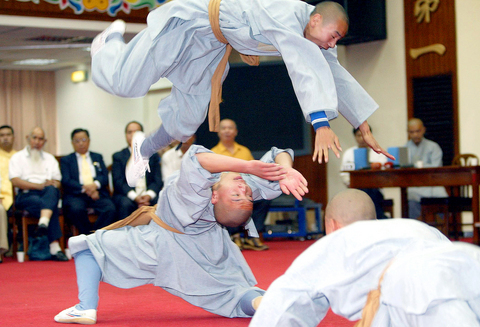After months of haggling over the details of their visit, a group of Shaolin monks from China arrived in Taiwan to exchange skills with martial arts professionals and offer free performances of their world-famous fighting techniques to the general public.
The 19-member delegation, which arrived on Thursday and is slated to depart on Sept. 1, visited the legislature yesterday to offer a treat to the media before presenting routine performances from today through Aug. 26 in Chiayi County, Kaohsiung City, Taichung County, Hsinchu City, Ilan City and Taipei City. Admission to all of their public events is free.
Before the Shaolin monks gave their performances, six kung fu practitioners from the Taipei Chinese Kung Fu Association greeted the young guests with their own individual performances.

PHOTO: CNA
The event was organized by the Chinese Shaolin Association. The association had arranged for 45 monks from the Songshan Shaolin Temple in Henan Province to teach Shaolin kung fu at summer camps.
According to the original itinerary, which would have kicked off on July 25, classes were to be open to the general public and be held at public facilities such as school playgrounds and parks. The activity had attracted more than 4,000 students who had enrolled at a cost of NT$1,200 (US$37.62) each.
At the insistence of the Mainland Affairs Council, the size of the group was downsized and the schedule was pushed back. Members must also enter and leave the country as a group, and stay in one group during the visit.
Saying that summer camps did not constitute professional exchanges, the council requested the monks limit their "exchanges" to martial arts professionals and not the general public. In addition, charging for lessons was deemed illegal.
Andrew Lin (林逸士), chairman of the Chinese Shaolin Association, said that although the event sponsor, security company Taiwan SECOM (中興保全), had bailed out, he is confident that the events will be successful.
"I'm sure Buddha will be on our side and make things alright," said the 54-year-old Lin, who converted to Buddhism and became a vegetarian at the age of 36.
According to Lin, Taiwan SECOM invested about NT$10 million in sponsorship money. While the money has already been spent, primarily on publicity, they still need another NT$10 million. The estimated budget for the original schedule was NT$50 million.
Lin said that he understands the government's concern over national security and he is aware that the council is just doing their job in accordance with the law.
However, he said that he believes the invited monks would not do anything to sabotage national security.
One monk, 18-year-old Shih Yen Lu (釋延路) from the northeastern Chinese province of Shandong, said that although their days are busy at the temple, and sometimes boring, he does not regret joining the century-old martial arts center.
"I am very happy to be with my brothers, and our masters are very nice, although they can be very strict sometimes," he said.

The Ministry of Economic Affairs has fined Taobao NT$1.2 million (US$36,912) for advertisements that exceed its approved business scope, requiring the Chinese e-commerce platform to make corrections in the first half of this year or its license may be revoked. Lawmakers have called for stricter enforcement of Chinese e-commerce platforms and measures to prevent China from laundering its goods through Taiwan in response to US President Donald Trump’s heavy tariffs on China. The Legislative Yuan’s Finance Committee met today to discuss policies to prevent China from dumping goods in Taiwan, inviting government agencies to report. Democratic Progressive Party Legislator Kuo Kuo-wen (郭國文) said

The Ministry of Economic Affairs has fined Taobao NT$1.2 million (US$36,900) for advertisements that exceeded its approved business scope and ordered the Chinese e-commerce platform to make corrections in the first half of this year or its license would be revoked. Lawmakers have called for stricter supervision of Chinese e-commerce platforms and more stringent measures to prevent China from laundering its goods through Taiwan as US President Donald Trump’s administration cracks down on origin laundering. The legislature’s Finance Committee yesterday met to discuss policies to prevent China from dumping goods in Taiwan, inviting government agencies to report on the matter. Democratic Progressive Party

Taiwan and its Pacific ally Tuvalu on Tuesday signed two accords aimed at facilitating bilateral cooperation on labor affairs, according to Taiwan’s Ministry of Foreign Affairs (MOFA). The governments inked two agreements in Taipei, witnessed by Foreign Minister Lin Chia-lung (林佳龍) and visiting Deputy Tuvaluan Prime Minister Panapasi Nelesone, MOFA said in a news release. According to MOFA, the agreements will facilitate cooperation on labor issues and allow the two sides to mutually recognize seafarers’ certificates and related training. Taiwan would also continue to collaborate with Tuvalu across various fields to promote economic prosperity as well as the well-being of their

Sung Chien-liang (宋建樑), who led efforts to recall Democratic Progressive Party (DPP) Legislator Lee Kun-cheng (李坤城), was released on bail of NT$80,000 today amid outcry over his decision to wear a Nazi armband to questioning the night before. Sung arrived at the New Taipei District Prosecutors’ Office for questioning in a recall petition forgery case last night wearing a red armband bearing a swastika, carrying a copy of Adolf Hitler’s Mein Kampf and giving a Nazi salute. Sung left the building at 1:15am without the armband and covering the book with his coat. Lee said today that this is a serious